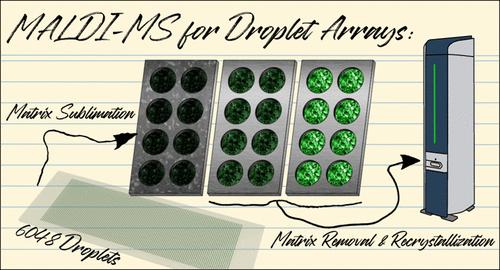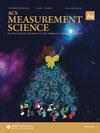MALDI Mass Spectrometry on High-Density Droplet Arrays: Matrix Deposition, Selective Removal, and Recrystallization
IF 4.6
Q1 CHEMISTRY, ANALYTICAL
引用次数: 0
Abstract
High-density droplet arrays are emerging as a powerful tool for high-throughput bioanalytical applications. These arrays are formed of thousands of nanoliter droplets, which can be analyzed by various optical and spectroscopic methods as well as label-free matrix-assisted laser desorption/ionization mass spectrometry (MALDI-MS). However, special precautions are required for the massive number of small droplets, particularly in the deposition of matrix compounds. Here, we introduce a new workflow for the analytical preparation of an array comprising 6048 droplets, which significantly improves the intensity of the MALDI-MS signals. We deposited matrix compounds in a custom-made sublimation chamber followed by a recrystallization step to achieve significant signal intensity increases for three model proteins with low, medium, and large masses, respectively. Furthermore, selective removal of the matrix before recrystallization enhanced the spatial resolution and increased the signal intensity by an average of 57%. This method can be easily standardized and upscaled for the preparation of an even larger number of droplets per array for MS analysis.

高密度液滴阵列上的 MALDI 质谱分析:基质沉积、选择性去除和重结晶
高密度液滴阵列正在成为高通量生物分析应用的强大工具。这些阵列由数千个纳升液滴组成,可通过各种光学和光谱方法以及无标记基质辅助激光解吸电离质谱(MALDI-MS)进行分析。然而,对于大量的小液滴,尤其是基质化合物的沉积,需要采取特别的预防措施。在此,我们介绍了一种新的工作流程,用于分析制备由 6048 个液滴组成的阵列,从而显著提高 MALDI-MS 信号的强度。我们在定制的升华室中沉积基质化合物,然后进行重结晶步骤,从而使三种低、中、大质量的模型蛋白质的信号强度分别得到显著提高。此外,在重结晶前选择性地去除基质可提高空间分辨率,并使信号强度平均提高 57%。这种方法可以很容易地标准化和升级,以便为质谱分析制备每个阵列中更多的液滴。
本文章由计算机程序翻译,如有差异,请以英文原文为准。
求助全文
约1分钟内获得全文
求助全文
来源期刊

ACS Measurement Science Au
化学计量学-
CiteScore
5.20
自引率
0.00%
发文量
0
期刊介绍:
ACS Measurement Science Au is an open access journal that publishes experimental computational or theoretical research in all areas of chemical measurement science. Short letters comprehensive articles reviews and perspectives are welcome on topics that report on any phase of analytical operations including sampling measurement and data analysis. This includes:Chemical Reactions and SelectivityChemometrics and Data ProcessingElectrochemistryElemental and Molecular CharacterizationImagingInstrumentationMass SpectrometryMicroscale and Nanoscale systemsOmics (Genomics Proteomics Metabonomics Metabolomics and Bioinformatics)Sensors and Sensing (Biosensors Chemical Sensors Gas Sensors Intracellular Sensors Single-Molecule Sensors Cell Chips Arrays Microfluidic Devices)SeparationsSpectroscopySurface analysisPapers dealing with established methods need to offer a significantly improved original application of the method.
 求助内容:
求助内容: 应助结果提醒方式:
应助结果提醒方式:


